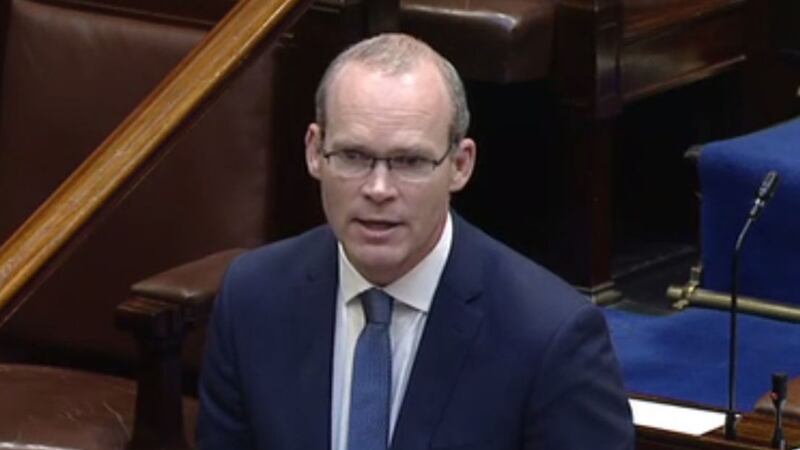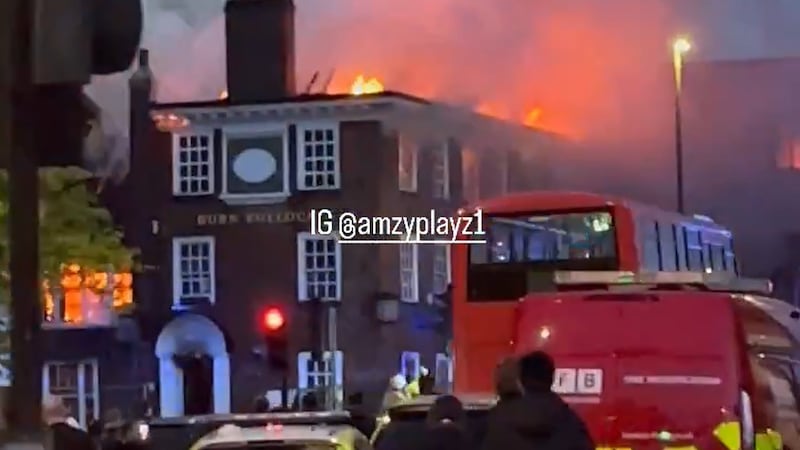The Republic will not back any Brexit divorce deal that alters the core principles of this week's ill-fated draft UK/EU agreement, the Tánaiste has insisted.
Simon Coveney said the Dublin government would consider alternative proposals if any are forthcoming from London, but stressed it would not countenance anything that fell short of the assurances it needs over the shape of the border post Brexit.
The Tánaiste told the Dáil: "We are in a position where we still need to find a way forward but, let me be very clear, the core issues that Ireland got agreement on at the start of this week are not changing."
British Prime Minister Theresa May is facing a high-pressure race against time to make progress in talks with Brussels amid a deadlock over the border.
Mrs May is hoping to make a new offer by Friday to satisfy both the Dublin government and the DUP which props up her government and scuppered a deal on divorce issues on Monday.
The mooted agreement between the UK and EU, which envisaged the alignment of regulations north and south to maintain free flow of goods, was torpedoed after the DUP rejected it.
Mr Coveney insisted the Republic was advocating a solution that would benefit all the people of the island and also Britain.
"There are lots of issues that are subject to negotiation," he said.
"We accept that the British government is trying to move this process forward in good faith.
"We want to work with them on that, and not against them.
"But Ireland has real concerns and they are important to this country and its future and they are important to this island and its future and we have an obligation to ensure we act accordingly."
The senior Fine Gael TD added: "We will not support anything that in our view risks the re-emergence of a hard border on this island in the context of these negotiations."
Sinn Féin urged Mr Coveney to go further, and state that his government would not sign up to any deal that saw Northern Ireland leave the formal customs union and single market structures.
The Tánaiste declined, adding: "This is a sensitive negotiation at a very, very sensitive time so what you are not going to get from me is statements that are going to stoke up what is already a difficult relationship management exercise."
Pressure is growing on Mrs May to get leaders at the December 14 European Council summit to declare sufficient progress has been made on divorce issues so trade talks can begin, with business chiefs warning companies will activate contingency plans that will cost Britain jobs if there is further delay.
After talks in Dublin on Wednesday night, Taoiseach Leo Varadkar and Dutch PM Mark Rutte made clear the EU would not compromise and allow the Irish border to be kicked down the road to phase two of the talks, even under threat of Britain crashing out with no deal or divorce negotiations dragging on to 2018.
And after a phone call with Mrs May on Wednesday, Mr Varadkar said the PM was hoping to return with a new formal written offer by Thursday, but warned, if there was no agreement, talks would be picked up in the New Year.
On Thursday morning, Mrs May's official spokesman said: "As the prime minister set out at the start of the week and in the Commons, we are close to an agreement, but there is more work still to be done. It is an ongoing process."
The spokesman said contact with the Taioseach was currently going on at "sherpa" level.
British Transport Secretary Chris Grayling, one of the most prominent Brexiteers in the Cabinet, said he remained optimistic a resolution could be found.
Businesses in the Republic would suffer if no agreement was reached on the border, he warned.
He said that the "regulatory alignment" proposed by the British prime minister in Monday's text - a phrase which alarmed the DUP - did not involve laws within the post-Brexit UK being the same as those in the rest of Europe.
"We don't have to have, we have never said we will have and we don't want a situation where in future our laws are identical to those of the EU," he said.
"There will be areas where we do things in a very similar way, there are will be areas where we don't do things in a similar way.
"That's all the prime minister was seeking to achieve, to make sure we can ensure that trade flows as freely as possible across the border of Northern Ireland and southern Ireland."
British Foreign Secretary Boris Johnson insisted any Brexit deal must stick to the spirit of the Leave campaign.
"It is very, very important that whatever happens now, whatever we agree, has got to be consistent with taking back control of our laws, of our borders and of our cash," he said.
Mr Johnson said Britain was making a "very good" financial offer to the EU, and when he had said people could "go whistle" for a large exit settlement he was referring to amounts of between £80 billion - £100 billion.
"I was asked my reaction to some of the very extortionate sums that I had heard in the region of £80 or £100 billion, and, I don't want to repeat the offending phrase, but go whistle seems the appropriate reaction to that kind of money," he said.
"When it comes to other sums and other obligations, a more detailed examination of our obligations, our financial obligations, I think you will find the British Government is absolutely punctilious in wanting to meet our friends more than half way and to be useful.
"I think you will find the financial offer that we are making is very good, but it is nowhere near the sums that I was first invited to comment on in a musical way."
Pressed on whether he was comfortable with a widespread regulatory alignment between the UK and EU after Brexit, the foreign secretary said: "You can take it from me that whatever comes up, whatever the solution that we come to, whatever we devise getting on to the body of the talks, it's got to be consistent, it's got to be consistent with the whole of the United Kingdom taking back control."
On Thursday, members of the House of Commons Brexit committee visited parts of the Irish border to hear from local people about their concerns.
Sinn Féin's Stormont leader Michelle O'Neill said the DUP did not represent the majority view in Northern Ireland, where 56% voted Remain in last year's referendum.
"They are consistently turning their face towards a hard border," she said in Belfast.
"I have made that very clear to Theresa May."
Her comments came as an opinion poll suggested a clear majority of people in the region - 58% - are in favour of Northern Ireland retaining membership of the single market and customs union.
The Lucidtalk poll, commissioned by the European United Left - Nordic Green Left group in the European Parliament, also suggested that, in the event of a "no deal" hard Brexit, more people in Northern Ireland would prefer to join a united Ireland to maintain EU membership than stay in a UK outside the European Union (48% to 45%).
Mrs O'Neill said the north was facing a crucial "48 hours" and called on the Irish government to stand up for everyone on the island.
She said there could be no "roll back" on what was on the table on Monday, insisting protections to ensure a soft border should even be made stronger.








